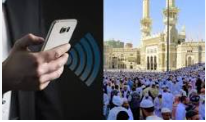Bridging the Digital Divide: Exploring Free Wi-Fi Services in Saudi Arabia
Introduction :
In an increasingly connected world, access to the internet has become an essential requirement for individuals and businesses alike. Recognizing the importance of bridging the digital divide, the Kingdom of Saudi Arabia has taken significant strides in providing free Wi-Fi services to its citizens and residents. This blog aims to delve into the realm exploring the benefits, initiatives, challenges, and the transformative impact they have on various sectors.

- Empowering Connectivity for All :
Free Wi-Fi services in Saudi Arabia play a crucial role in empowering connectivity for all, ensuring that people from all walks of life have access to the internet. By eliminating the barrier of cost, free Wi-Fi enables students, job seekers, and individuals in underserved communities to access educational resources, search for employment opportunities, and connect with the digital world.
Public Wi-Fi hotspots, deployed in strategic locations such as malls, parks, airports, and government institutions, allow individuals to stay connected and access online services conveniently. This initiative has not only improved the quality of life for citizens but has also created opportunities for businesses and entrepreneurs to innovate and thrive in the digital economy.
- Government Initiatives :
The Saudi Arabian government has been proactive in implementing initiatives to provide free Wi-Fi services across the country. The “Wifi.sa” project, launched by the Communications and Information Technology Commission (CITC), aims to enhance internet connectivity by offering free Wi-Fi in public spaces. This project includes the installation of Wi-Fi hotspots in various locations, ensuring widespread coverage.
Another notable initiative is the “Makkah Smart City” project, which focuses on providing free Wi-Fi services in the holy city of Makkah. The project aims to enhance the experience of pilgrims by providing seamless connectivity throughout their journey, allowing them to stay connected with their loved ones and access religious and logistical information.
Additionally, several government entities, educational institutions, and public libraries have implemented their own free Wi-Fi initiatives to promote digital inclusion and facilitate access to information.
- Transformative Impact on Various Sectors :
The provision of free Wi-Fi services in Saudi Arabia has had a transformative impact on various sectors, including education, tourism, and entrepreneurship.
a. Education: Free Wi-Fi in educational institutions enables students to access online learning resources, collaborate with peers on projects, and stay updated with the latest information. It bridges the gap between urban and rural areas, providing equal opportunities for students to engage in digital learning.
b. Tourism: Free Wi-Fi services in tourist destinations and hotels enhance the experience of international visitors. It allows them to access travel information, navigate unfamiliar areas, and share their experiences in real-time, promoting the tourism industry and encouraging positive reviews and recommendations.
c. Entrepreneurship: Free Wi-Fi services provide aspiring entrepreneurs with the necessary tools to start and grow their businesses. It enables them to conduct market research, establish an online presence, and connect with potential customers and investors. This fosters innovation, economic growth, and job creation in the country.
- Addressing Challenges :
While the provision of free Wi-Fi services in Saudi Arabia brings numerous benefits, challenges must be addressed for optimal implementation. Some of the challenges include:
a. Infrastructure: Expanding the Wi-Fi infrastructure to cover remote and underserved areas requires significant investment and coordination between government bodies, telecommunication providers, and the private sector.
b. Network Security: Ensuring the security and privacy of users’ data is paramount. Implementing robust security measures and educating users about online risks are essential to protect personal information and maintain trust in free Wi-Fi services.
c. Bandwidth Management: As the number of Wi-Fi users increases, managing bandwidth becomes crucial to maintain quality and reliability. Effective bandwidth management techniques must be employed to ensure an optimal user experience.
Conclusion :
The provision of free Wi-Fi services in Saudi Arabia is a testament to the country’s commitment to bridging the digital divide and empowering its citizens and residents. Through government initiatives, strategic partnerships, and the deployment of Wi-Fi hotspots, Saudi Arabia has made significant progress in enhancing connectivity.
The transformative impact of free Wi-Fi services extends to various sectors, enabling access to education, bolstering tourism, and fostering entrepreneurship. However, challenges such as infrastructure expansion, network security, and bandwidth management need to be addressed to ensure the sustained success of these initiatives.
By continuing to invest in free Wi-Fi services, Saudi Arabia paves the way for a more inclusive and connected society. The benefits of bridging the digital divide extend beyond individual empowerment, contributing to economic growth, innovation, and the overall development of the nation.
